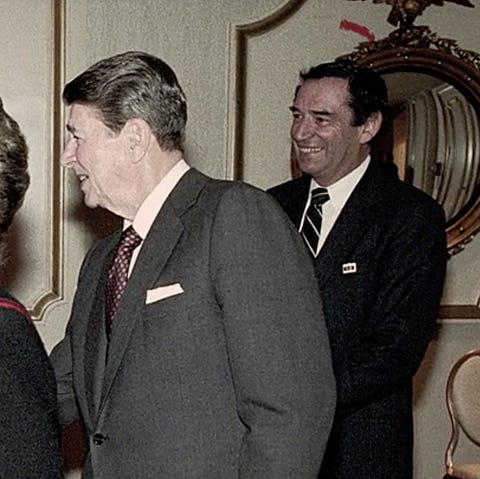
Daughter Babylon, doomed to destruction,
happy is the one who repays you
according to what you have done to us.
Happy is the one who seizes your infants
and dashes them against the rocks.
— Psalms 137
It’s been one of the fundamental quandaries of the presidency of Donald J. Trump: How can a man so overtly dedicated to the banality of evil still retain widespread support among Christians?
This is the question that Netflix’s newest harrowing documentary, The Family, attempts to answer over five episodes. Directed by Jesse Moss (The Overnighters), the limited series is based on the non-fiction investigations The Family and C Street, written by Dartmouth College journalism professor and religious scholar Jeff Sharlet. And while the answer isn’t presented as cut-and-dry as it could be, The Family is a profoundly troubling examination of the theocracy that wields power behind-the-scenes in Washington D.C.
The Family, officially The Fellowship Foundation, is an aggregation of non-profit organizations that ostensibly work to spread the word and adhere to the teachings of Jesus. As Sharlet revealed in his books and as Moss expands on in The Family, however, there is a very thin line between evangelizing the work of Jesus and seeking access to those in power through spiritual obligation.
Through interviews with current and past members and true believers and skeptics in the faith community, The Family delves into the hierarchy of the secretive organization and its development into a behind-the-scenes powerhouse under its longtime associate director, Douglas Coe, who died in 2017. The narrative is helped immeasurably by the first-person account of Sharlet, who was unwittingly recruited into the organization and invited to live at Ivanwald, a communal living/indoctrination center for young men in Arlington, Va.
As the series unfolds, Trump’s actions that are seen as inexplicable and irredeemable by the secular press are revealed, through incredible leaps of logic and stunningly short-sighted Biblical interpretation, to actually be victories to this community that seeks power through proximity to important figures.
Trump is a “flawed vessel,” the “wolf king” that can wield power in Jesus’ name like no other. The Bible shows that great men can sin grievously – ever hear of King David and Bathsheba? In that light, his reprehensible actions don’t matter as much as the fact that Trump was chosen by a higher power, a selection that automatically puts him in a category unto himself. We are all Chosen, apparently, but some are much more Chosen than others and those people are to be deified.
The big frustration with The Family is that it explores so many different tentacles of the organization that it fails to come to a cohesive whole. The five hours could have spent drawing a clear throughline between the history of the Foundation and its impact – yes, complete with Russian meddling at the National Prayer Breakfast – up to the election of Trump; instead there are asides that aren’t as compelling, such as Moss’ participation in a local prayer group and visits to several foreign countries to see the international impact of the The Family’s efforts to advocate for anti-gay legislation.
In addition, recurring re-enactments of Sharlet’s experiences at the youth center run by The Family give it an unintentional CW cast-joins-a-cult vibe; most jarring in these sequences is the appearance of instantly recognizable James Cromwell as Coe.
The message, however, remains undiminished. There is a theocracy behind our country’s most baffling choices and its refusal to act is why a truckload of straw bales hasn’t been enough to break the camel’s back when it comes to some Christians and their love of Trump. The biggest sin of all, it appears, is believing in predestination.
